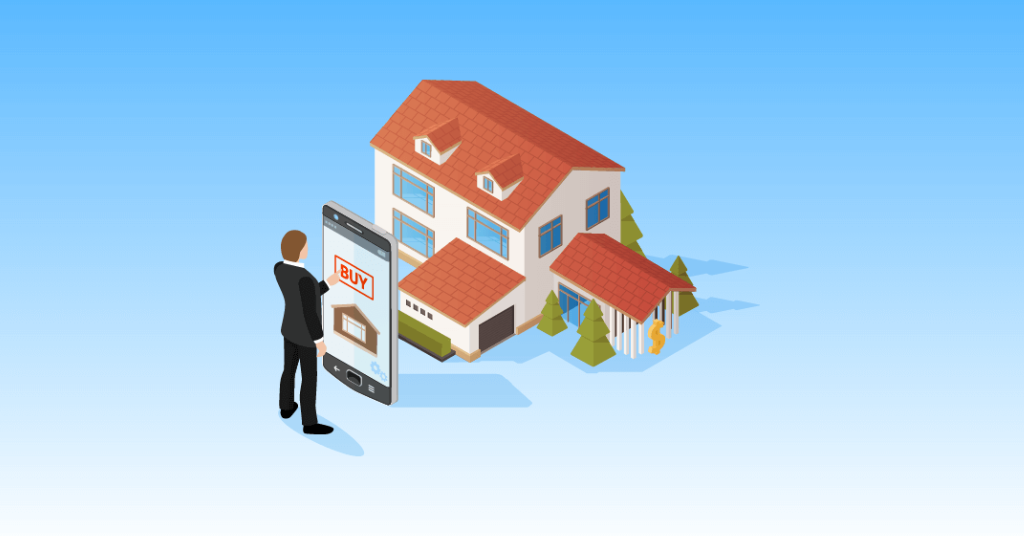
Real Estate App Development Key Features and Cost Breakdown
The real estate industry has undergone a significant transformation in the past decade, driven largely by technological advancements. Real estate app development has become a critical aspect for businesses to stay competitive and meet the growing needs of consumers who increasingly prefer digital solutions for their property searches and transactions. With the increasing adoption of smartphones and the demand for on-the-go services, developing a real estate app is a strategic move for businesses in this sector. In this blog post, we will explore the key aspects of real estate app development, including the costs, key features, and the overall process involved in creating an app that stands out in the competitive market.
Real Estate App Stats: Key Highlights
It's crucial to examine some striking data in order to comprehend the significance of real estate apps:
Use of Real Estate Apps:
In 2020, 44% of homebuyers searched for properties using mobile devices, per a report by the National Association of Realtors.
Mobile Real Estate Search:
The use of mobile apps is on the rise in the real estate sector. In 2021, mobile devices accounted for nearly 77% of all real estate searches in the United States.
App Downloads:
With over 10 million installs each, Zillow, Realtor.com, and Redfin are the most popular real estate apps on the Google Play Store and App Store, with millions of downloads.
Consumer Behaviour:
To browse properties, save time, and make snap decisions, a significant portion of consumers favour using real estate apps. Apps improve the user experience by enabling users to filter properties according to particular parameters like location, price range, and property type.
These figures demonstrate how mobile apps are becoming more and more popular for property searches, so it makes sense for real estate firms to invest in creating an app that combines cutting-edge technology with user-friendly features.
How Does It Work?
The process of purchasing, selling, or renting a property is made easier by a real estate app, which links prospective tenants, buyers, and sellers with available properties and real estate brokers. Typically, the core functionality consists of:
Property Listings:
Using filters like location, price range, property type, etc., users can peruse a variety of property listings.
Property Search:
Using sophisticated search parameters like square footage, number of bedrooms, amenities, and accessibility to schools and public transportation, among others, the app enables users to look for properties.
Virtual Tours:
To give users an immersive look at properties without having to visit in person, real estate apps frequently include 360-degree photographs or virtual reality (VR) tours.
Maps and Location:
With information about nearby schools, parks, stores, and public transportation, real-time maps and location services assist users in viewing properties in the neighbourhoods of their choice.
Communication:
Many apps have communication features that let users ask questions about properties, set up viewings, or get in touch with agents or sellers directly.
Understanding Real Estate Apps
Apps for real estate are online resources created to make the process of purchasing and selling real estate easier. They can serve investors, developers, real estate brokers, and individual purchasers. These applications may be web-based (for desktop computers) or mobile-based (for smartphones and tablets). They link users to real estate agents, available listings, and even outside services like mortgage lenders and home inspectors.
To improve user experience and streamline the real estate purchasing process, these apps frequently incorporate features like real-time property updates, push notifications, instant messaging, and AI-powered recommendation systems.
Real Estate App Types
Apps for real estate can be categorised according to their functionality and target user bases. Among the most prevalent kinds are:
Apps for property searches:
Zillow, Realtor.com, and Trulia are just a few examples of apps that offer a vast database of real estate listings, filters, and maps to assist users in finding the perfect home based on their criteria.
Real estate agents can manage client information, appointments, documents, and leads with the help of these apps.
Landlords, property managers, and property owners use property management apps to manage tenants, keep track of maintenance requests, and process rental payments.
Investment Apps:
Apps such as Roofstock and Fundrise give users the ability to purchase and sell real estate investments.
Auction Apps:
These applications are designed especially for users who want to purchase real estate through online auctions; they frequently highlight distressed sales or discounted properties.
Top Apps for Real Estate on the Market
A number of apps dominate the competitive real estate app market. The following are a few of the top apps available:
One of the most widely used real estate apps is Zillow, which has a sizable database of listings and incorporates Zestimate (an estimate of a home's market value), pricing trends, and sophisticated search filters.
Realtor
This app offers comprehensive details about real estate for sale along with practical features like mortgage calculators and direct agent communication.
Redfin:
Well-known for its extensive real estate search capabilities, Redfin also provides features like scheduling property tours, neighbourhood analysis, and estimating home prices.
Trulia:
Trulia specialises in offering comprehensive neighbourhood information, such as crime maps, school rankings, and nearby facilities.
Homesnap:
With its user-friendly interface and real-time MLS data, this app is a favourite among both buyers and agents.
Why Purchase a Real Estate App?
Mobile apps are now a vital tool for staying ahead of the competition in the booming real estate sector. Purchasing a real estate app is a wise decision for the following reasons:
Accessibility:
While on the go, users can easily access property listings, prices, and photos through apps.
Simplified Procedures:
Apps make the purchasing process more effective by enabling virtual tours, fast searches, and direct communication with agents.
Customer satisfaction:
Customers are guaranteed to never miss out on new properties or price adjustments thanks to real-time notifications and updates.
Brand Recognition:
A well-designed app can draw in new clients who are searching for a more convenient way to find properties and increase the visibility of your brand.
Competitive Edge:
You can differentiate your company from rivals by using an app that provides special features like virtual reality tours or AI-based property recommendations.
20 Essential Features of Real Estate Apps You Must Have
Adding features that will increase user satisfaction and engagement is crucial when creating a real estate app. The following 20 essential features are necessary for any real estate app:
Property Listings:
Detailed listings that include specifics about every property.
Advanced search parameters, such as price range, location, property type, amenities, and square footage, are available.
Interactive Maps:
Real-time map integration that displays the locations of properties and adjacent facilities.
Virtual Tours:
360-degree images or virtual reality integration for online property tours.
Saved Searches and Alerts:
Users have the option to save their search parameters and get alerts whenever new listings fit their criteria.
Property Price History:
Past pricing information to help users understand market patterns.
Mortgage Calculator:
An integrated tool that computes monthly mortgage payments according to the loan terms and the user's budget.
Push Notifications:
Immediate notifications of price reductions, new listings, or crucial agent messages.
Contact Agents:
To get in touch with real estate agents, use the direct messaging or phone feature.
User Profiles:
Make a customised profile for users to save their preferred searches, properties, and other information.
User reviews and ratings are available for developers, agents, and properties.
Setting Up Viewings:
The ability to set up tours or property viewings straight from the app.
Social Media Integration:
Post properties on Facebook, Instagram, Twitter, and other social media sites.
Real Estate News:
Provide users with up-to-date information on market trends and news.
Integration of Payment Gateways:
Enable online payments for purchases, deposits, and reservation fees.
Using augmented reality (AR), users can see how a property will appear with various furniture pieces or home remodelling projects.
Voice Search:
To make property hunting more convenient, voice-enabled search is now available.
Neighbourhood Information:
Comprehensive details about the neighbourhood, such as schools, transportation, amenities, and crime rates.
Property Comparison:
Give users the ability to contrast several properties.
Document Management: Safe exchange and administration of contracts, agreements, and other documents.
Is It Time to Create a Real Estate App
Yes, is the response! It is anticipated that the real estate market will continue to change in 2025, with a greater reliance on mobile apps for communication, transactions, and property searches. Convenience is something that consumers are seeking more and more, and apps offer a simple solution. Furthermore, real estate apps will become even more essential for agents and buyers as cutting-edge technologies like AI, AR, and VR are integrated.
Detailed Instructions for Developing a Real Estate App
A methodical approach is necessary to develop a successful real estate app. Here is a detailed guide:
Market research:
Recognise your real estate app competitors and target markets.
Establish Your Business Model:
Decide which kind of real estate app you wish to develop (investment, agent, property search, etc.).
Design the User Interface:
To see the features and layout of the app, make wireframes and prototypes.
Select a Development Platform:
Choose between cross-platform apps, iOS apps, or Android apps.
Create the app by writing the code, integrating APIs, and creating the essential functionalities.
Test the App: To ensure a flawless user experience and address bugs, thoroughly test the app.
Launch and Marketing: Use social media, sponsored advertisements, and SEO tactics to promote the app after it is released on the App Store and Google Play.
Problems with Real Estate App Development and Their Fixes
1. Complicated User Interface; Fix: Make the design clear, easy to use, and intuitive.
2. Data Security Fix: Use encryption and safe data storage techniques to safeguard user data.
Real-time property updates are a challenge. The solution is to use APIs to retrieve real-time data and quickly update property listings.
User Retention Challenge: Use gamification elements, personalised recommendations, and push notifications to keep users engaged.
Challenge: Compliance Solution: Make sure your app conforms with all legal requirements and stay up to date on local regulations.
Regulations to Watch Out for in the Real Estate Sector
Following industry rules is essential when creating a real estate app. Among the important rules are:
Data privacy: To guarantee the security of users' personal information, adhere to the CCPA, GDPR, and other data protection regulations.
Make sure your app doesn't discriminate against people based on their race, colour, religion, gender, family status, or disability in accordance with the Fair Housing Act.
MLS Rules: Make sure that local MLS rules are followed if you integrate MLS listings.
Financial Regulations: Adhere to financial regulations, such as know-your-customer (KYC) and anti-money laundering (AML) laws, if your app manages financial transactions.
Essential Features to Provide
Registration of Users
User registration not only enables personalised profiles but also stores communication histories, preferences, and searches. By enabling users to track properties, get recommendations, and communicate securely with agents, it improves security and engagement.
Listings of Properties
Listings of available properties highlight important information such as size, location, price, and photos. Frequent updates guarantee that users see the most recent options customised to their preferences, making decision-making simpler.
Filters for Search
Users can use search filters to refine property results according to features, location, and price. It helps users find properties that closely match their needs by streamlining the search process.
Details of the Property
The property details provide comprehensive information, includingmenities, price, pictures, and descriptions. Before setting up viewings or getting in touch with agents, users can view virtual tours and property features to help them make well-informed decisions.
Communicating with Agents
Asking questions, setting up viewings, and negotiating terms are all made simpler with in-app messaging. This feature simplifies real-time interaction, fostering faster responses and boosting user engagement.
Favourite Real Estate
Favourite properties can be saved by users for convenient access and comparison. By offering a customised experience and allowing users to monitor several properties of interest, this feature facilitates the decision-making process.
Integration of Maps
Maps integration gives users a better grasp of the property's surroundings by displaying the locations of properties and adjacent amenities. By assisting users in assessing accessibility, local amenities, and proximity to necessary services, this feature improves decision-making.
Advanced Functionalities to Incorporate
Virtual Tours
Through the use of 360-degree photos or video walkthroughs, virtual tours enable users to remotely inspect properties. By allowing prospective tenants or buyers to view properties virtually, this immersive feature improves the experience.
AR, or augmented reality
Digital images are superimposed on actual environments using augmented reality (AR). By enabling users to see properties with virtual furnishings or other changes, augmented reality (AR) in real estate apps helps users make better decisions and improve the viewing experience.
AI-driven Suggestions
AI-powered recommendations use algorithms to propose properties based on user preferences, behaviour, and previous searches. By displaying pertinent listings, these tailored recommendations enhance user experience and make property searches more focused and effective.
Voice Search
Users can use voice search to look for properties by uttering commands. Quick and effective property searches are made possible by this hands-free feature, which improves user experience, particularly when multitasking or on the go.
Management of Documents
Important Users can store, share, and organise important real estate documents such as contracts, agreements, and property details with the aid of document management. This feature ensures that users have safe and convenient access to the necessary documentation throughout the monetization process.
Subscription Model: To list properties, charge property owners or real estate brokers a subscription fee.
Freemium models charge for premium services while providing basic features for free.
Advertising: Show advertisements inside the app and get money from companies that deal with real estate.
Commission Model: Take a cut of real estate sales.
The Process of Development
Planning: Choose platforms, define features, and choose a technology stack.
Design: Produce prototypes, UI/UX designs, and wireframes.
Development: Create the application, incorporate APIs, and add functionality.
Testing: Examine the app's functionality, usability, and bugs.
Launch: Make the app available and promote it.
Maintenance: Add new features and enhancements to the app on a regular basis.
The price of creating a real estate app
A number of variables, including features, platform (iOS, Android, or both), and the location of the development team, can affect the price of creating a real estate app. Generally speaking:
Basic App: between $20,000 and $30,000.
App for Medium Complexity: $30,000 to $50,000
High-end app: $50,000 to $100,000 or more
Structure of the Development Team
The project manager oversees the entire undertaking.
UI/UX Designer: Creates the user interface for the application.
App Developer: Creates iOS and Android applications.
Managing the server-side infrastructure is the responsibility of the backend developer.
A QA tester makes sure there are no bugs in the app.
Your Reliable Real Estate App Development Partner is Team4Solution.
Our speciality at Team4Solution is creating unique real estate applications that are suited to your company's requirements. From planning and design to development and upkeep, our skilled staff offers comprehensive services. We guarantee that your app is secure, easy to use, and functional.
In conclusion
For companies in the real estate industry, developing real estate apps is a wise investment because they offer users convenience, real-time updates, and a smooth real estate purchasing process. You can create an app that stands out in the crowded market by emphasising features that are easy to use, cutting-edge technology, and strong security.
FQA
Q1: What is the price of creating a real estate app?
Depending on the platform, features, and complexity, the price can vary from $20,000 to $100,000.
Q2: What constitutes a successful real estate app?
Real-time updates, virtual tours, property listings, sophisticated search filters, and agent messaging are some of the main features.
Q3: How much time does it take to create an app for real estate?
Depending on the features and complexity of the app, the development period usually lasts between three and six months.
Q4: Is it possible to make money from my real estate app?
Subscription models, advertising, or commissions on real estate transactions are all viable ways to make money off of your app.
Q5: What difficulties arise when developing real estate apps?
Maintaining real-time property updates, adhering to regulations, and guaranteeing data security are among the difficulties.




